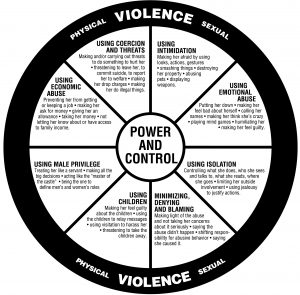Abusive Relationships

Power and Control Wheel
Domestic Abuse Intervention Project Project
www.duluth-model.org
Domestic abuse involves a complex dynamic of intimidation, fear, and a pattern of control within intimate relationships. It includes physical, sexual, psychological, and emotional abuse, and affects individuals from all backgrounds.
If you recognize the warning signs, please call our 24-hour domestic violence hotline at 208.343.7025 for safety planning, crisis counseling, and information referrals.
Warning Signs of an Abusive Relationship
- You avoid family and friends and/or your partner keeps you from family and friends. You spend all your free time with your partner.
- You do not participate in activities that you enjoyed before beginning the relationship. You experience sudden changes in eating habits, dress, or appearance.
- Your partner displays jealous or possessive tendencies but states that he/she is only looking after you and that it is because he/she loves you.
- Your partner frequently uses name-calling, threats, or intimidation against you.
- You are unable or fearful of making decisions without your partner. You have an unreasonable fear of upsetting your partner.
- You find yourself frequently justifying your partner’s behavior to your friends and family. You take the blame when your partner becomes upset or angry with you.
What to do if you are in an Abusive or Relationship
-
- Trust your instincts — you can seek resources for your safety.
- Call our 24-Hour Hotline: 208.343.7025 to speak to a trained client advocate and find out what resources are available to you, or visit our website’s Get Help section.
- Call 208.577.4498 and a WCA court advocate can assist you in developing a safety plan when you are ready to leave.
- Store important items and documents; or copies of them, for you and your children in a safe place (identification, birth certificates, social security cards, immigration documents, work permits, medical records, cash and ATM cards, keys, medications, and important phone numbers).
- Be safe — you can always call 911 if you are in immediate danger.
How to Help Someone in an Unhealthy Relationship
-
-
- Listen, believe, and validate them. Let him/her know that you care and you want them to be safe.
- Do not ask questions that imply blame. Someone who is being abused is not responsible for their partner’s choices or violence and does not deserve shame or blame.
- Do not be critical of the abusive partner — instead make firm statements that physical violence, emotional, verbal and/or any abuse of any kind — under any circumstance, is unacceptable.
- Do not assume that they are ready to leave the relationship or that you know what is best for her/him. Don’t pressure them to make quick decisions.
- Become a comfort zone for them, assure them that their conversation with you will not be revealed to their abuser.
- Assist them in getting legal help if necessary or with other sources of protection, such as protective orders, restraining orders, changing current phone numbers, etc.
- Do not force them or put pressure to not see the abuser. It may be very difficult to leave the relationship for many reasons. Respect their choices.
- Do not advise them to leave or judge them for staying. People are the best experts in their own lives and ultimately know what is best for themselves at any particular time.
- Provide information and resources in a non-judgmental and gentle manner so that they are able to make educated and informed decisions about their future.
- Provide a safe environment and opportunities for them to become aware of available resources, explore their options, and know that they do not deserve to be abused.
- Don’t underestimate the danger. Frequently, the most dangerous time for someone being abused is when they leave the abuser. If you fear for their safety, call 911 immediately.
-




